Guido Minnen
University of Sussex
Corpus Annotation for Parser Evaluation
Jul 08, 1999



Abstract:We describe a recently developed corpus annotation scheme for evaluating parsers that avoids shortcomings of current methods. The scheme encodes grammatical relations between heads and dependents, and has been used to mark up a new public-domain corpus of naturally occurring English text. We show how the corpus can be used to evaluate the accuracy of a robust parser, and relate the corpus to extant resources.
* 7 pages, LaTeX (uses eaclap.sty)
Selective Magic HPSG Parsing
Jul 08, 1999



Abstract:We propose a parser for constraint-logic grammars implementing HPSG that combines the advantages of dynamic bottom-up and advanced top-down control. The parser allows the user to apply magic compilation to specific constraints in a grammar which as a result can be processed dynamically in a bottom-up and goal-directed fashion. State of the art top-down processing techniques are used to deal with the remaining constraints. We discuss various aspects concerning the implementation of the parser as part of a grammar development system.
* 9 pages, LaTeX with 4 postscript figures (uses avm.sty, eaclap.sty and psfig-scale.sty)
Can Subcategorisation Probabilities Help a Statistical Parser?
Jun 21, 1998



Abstract:Research into the automatic acquisition of lexical information from corpora is starting to produce large-scale computational lexicons containing data on the relative frequencies of subcategorisation alternatives for individual verbal predicates. However, the empirical question of whether this type of frequency information can in practice improve the accuracy of a statistical parser has not yet been answered. In this paper we describe an experiment with a wide-coverage statistical grammar and parser for English and subcategorisation frequencies acquired from ten million words of text which shows that this information can significantly improve parse accuracy.
* 9 pages, uses colacl.sty
Magic for Filter Optimization in Dynamic Bottom-up Processing
Apr 29, 1996
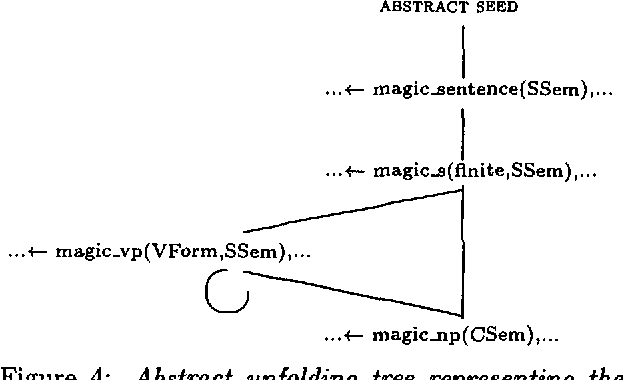
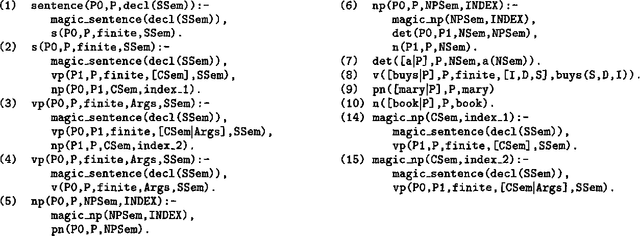
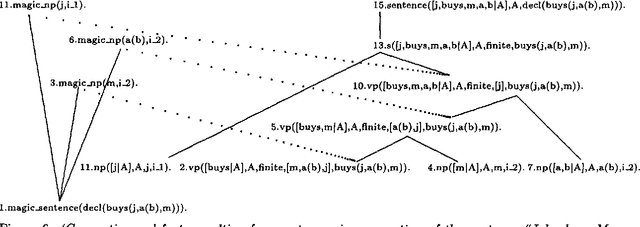
Abstract:Off-line compilation of logic grammars using Magic allows an incorporation of filtering into the logic underlying the grammar. The explicit definite clause characterization of filtering resulting from Magic compilation allows processor independent and logically clean optimizations of dynamic bottom-up processing with respect to goal-directedness. Two filter optimizations based on the program transformation technique of Unfolding are discussed which are of practical and theoretical interest.
* 8 pages LaTeX (uses aclap.sty)
Off-line Constraint Propagation for Efficient HPSG Processing
Apr 23, 1996Abstract:We investigate the use of a technique developed in the constraint programming community called constraint propagation to automatically make a HPSG theory more specific at those places where linguistically motivated underspecification would lead to inefficient processing. We discuss two concrete HPSG examples showing how off-line constraint propagation helps improve processing efficiency.
* 10 pages, uuencoded gzipped Postscript
A Computational Treatment of HPSG Lexical Rules as Covariation in Lexical Entries
Apr 04, 1995Abstract:We describe a compiler which translates a set of HPSG lexical rules and their interaction into definite relations used to constrain lexical entries. The compiler ensures automatic transfer of properties unchanged by a lexical rule. Thus an operational semantics for the full lexical rule mechanism as used in HPSG linguistics is provided. Program transformation techniques are used to advance the resulting encoding. The final output constitutes a computational counterpart of the linguistic generalizations captured by lexical rules and allows ``on the fly'' application.
Off-line Optimization for Earley-style HPSG Processing
Feb 07, 1995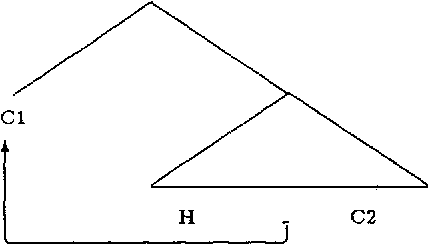
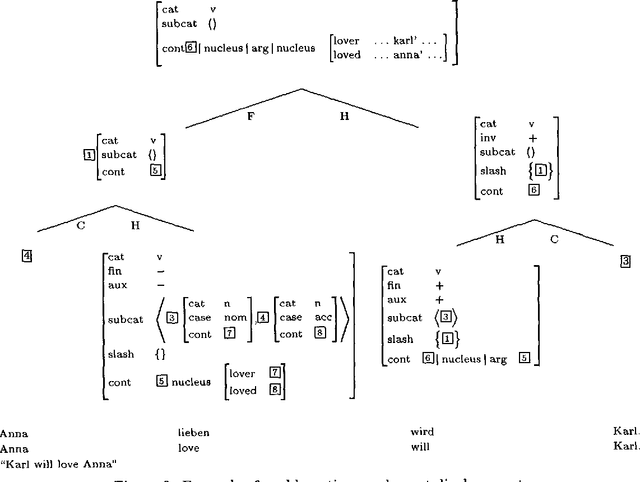
Abstract:A novel approach to HPSG based natural language processing is described that uses an off-line compiler to automatically prime a declarative grammar for generation or parsing, and inputs the primed grammar to an advanced Earley-style processor. This way we provide an elegant solution to the problems with empty heads and efficient bidirectional processing which is illustrated for the special case of HPSG generation. Extensive testing with a large HPSG grammar revealed some important constraints on the form of the grammar.
* 7 pages, LaTeX (avm.sty, eaclap.sty and tree-dvips)
 Add to Chrome
Add to Chrome Add to Firefox
Add to Firefox Add to Edge
Add to Edge